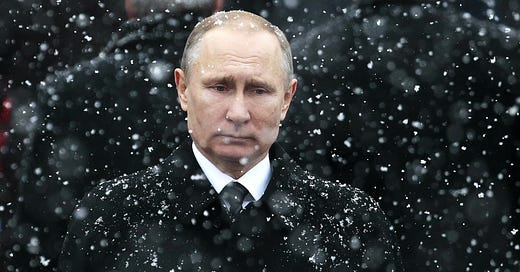Earthling: Putin beyond the brink
Plus: New species of China hawk, tweet of the week, and multiple good news stories (really!)
Pentagon officials are staging a revolt of sorts against President Biden. Concerned that the administration’s rhetorical response to Vladimir Putin’s nuclear saber rattling isn’t tough enough, they’ve gone after Biden with one of the most powerful weapons in the American arsenal: anonymous leaks to the press.
In Newsweek, veteran military correspondent William Arkin reports that several defense department officials, some military and some civilian, think the Biden administration is making a mistake by not saying that any Russian use of a nuclear weapon will bring nuclear retaliation. Arkin writes: “To deter Putin from using nuclear weapons in the first place, the officers say, the United States needs to talk the nuclear talk—and not be held back by the fear of having to walk the walk.”
In normal times—when the risk of nuclear war happening over the next few years is under one percent—the question of how to play the delicate game of nuclear deterrence seems academic. These haven’t been normal times since Putin invaded Ukraine, and they just got a lot less normal. Putin’s declared annexation of four Ukrainian provinces has elevated the already unusually high chances of a nuclear strike.
And not just, or even mainly, for the most commonly cited reason: that Putin has said threats to Russia’s “territorial integrity” could be met with a nuclear response, and annexation expands his conception of Russian territory in a way that defines lots of Ukrainian soldiers as such threats. As this newsletter has noted before, the most likely way for battlefield developments to trigger a nuclear strike isn’t by posing a threat to Russian territory but by posing a threat to Putin’s regime. And annexation commits Putin to a long and ambitious military struggle whose failure would radically raise the chances of his regime ending via palace coup. And he knows that.
So all the “academic” questions about nuclear deterrence—ambiguous versus unambiguous “signaling,” how to make deterrent threats powerful and credible without giving the enemy an itchier trigger finger, etc.—are now far from academic.
The Biden administration has already gone about as far as you can go without making the nuclear threat that Pentagon rebels are calling for. After Putin issued his “territorial integrity” warning, National Security Adviser Jake Sullivan said any Russian use of nukes would have “catastrophic consequences.” Sullivan added that in private communications with the Kremlin the administration has "spelled out in greater detail exactly what that would mean."
What bothers the Pentagon rebels is that these details apparently didn’t include a mushroom cloud. Arkin writes:
The military sources tell Newsweek that there are subtle moves being made with regard to nuclear threats, including moving submarines and aircraft and drilling B-52 bombers. But they stress that non-nuclear military options—the use of conventional weapons and special operations, as well as cyber and space attack—are front and center, to include a decapitation strike to kill Putin in the heart of the Kremlin.
Now, you might think that the threat of personal annihilation would lead Putin to pause before launching a nuclear weapon—even a tactical nuclear weapon aimed at, say, vacant Snake Island for “demonstration” purposes. Indeed, Dartmouth political scientist Nicholas Miller, a nuclear proliferation expert, worried on Twitter that this prospect could prove too threatening:
Call me crazy, but I'd rather not have a leader with 6,000 nuclear weapons think we might try to off him. I understand this is intended to deter Russia, but what if deterrence fails and Putin mistakes conventional retaliation for a decapitation effort? I'd rather not find out.
And Miller isn’t against forceful deterrence in principle; he approved of signals sent by anonymous “western officials” who leaked to the Financial Times that a nuclear strike by Moscow would bring “conventional military responses from western states to punish Russia”—aka war between NATO and Russia. Miller called this “far more credible than threatening nuclear retaliation and still powerful enough of a consequence that it should help induce caution in Moscow.”
One of the most famous images in the annals of deterrence theory came from the pioneering game theorist Thomas Schelling: Two cars are driving toward one another in a game of chicken. If one driver can rip out the steering wheel and throw it out the window in full view of the other driver, victory is all but assured; the other driver, if rational, will choose losing a game of chicken over death. The key to victory was making a threat of mutual annihilation 100 percent credible.
The real world, though, is a complicated place. It’s basically impossible, in a situation like the one we’re in, to give a threat of nuclear retaliation a toss-the-steering-wheel level of credibility. Putin can always suspect that Biden will flinch at the last minute. The question of whether Putin would bet on that suspicion being right has two parts: (1) Is Putin willing to take risks? (2) How strong is his incentive to take this risk?
The answers are: (1) Yes (though he hasn’t, over the years, taken many wild ones); (2) Quite possibly very strong, depending on how events unfold.
Russia expert Anatol Lieven argued this week in The Guardian—and reiterated on the Nonzero podcast—that another big military setback for Russia, on par with the humiliating September retreat from northeastern Ukraine, could bring a palace coup. Lieven envisions a graceful transition, with Putin ushered gently off stage and guaranteed a life of security and wealth. But, however acceptable that fate may seem to some (Boris Yeltsin, to take a relevant example), Putin is not the kind to accept such conspicuous and grand defeat casually—without, perhaps, first trying a Hail Mary pass.
One of Schelling’s other intellectual contributions—maybe his biggest—was to emphasize that war is a non-zero-sum game, always holding the possibility of a lose-lose outcome, including, when nuclear powers face off, a dramatically lose-lose outcome. Yet many American elites—politicians, journalists, even “think” tankers—have been reacting to this war as if it were a football game or some other purely zero-sum contest. They’ve celebrated Ukrainian gains on the battlefield with no ambivalence, blissfully unaware that dramatic Ukrainian military success was always bound to encourage Kremlin risk taking, raising the chances of regional or even nuclear war.
Now, with Ukraine’s big battlefield success having been followed by Russian mobilization and Putin’s declared annexation, bliss will be harder to come by even if awareness fails to grow.
[Note: See postscript below for provisional factual correction to this piece.]
Trees are going through a carbon-induced growth spurt, according to a study published this month in Nature Communications. Researchers examining increases in US tree biomass determined that rising carbon dioxide levels—driven largely by human-caused emissions—are producing “carbon fertilization,” whereby plants boost their rate of photosynthesis to make use of the unusually abundant CO2. These bigger, hungrier trees mean more carbon capture and less need for artificial fertilization. Carbon emissions are still on balance a bad thing for the planet—but, as the old saying goes, it’s an ill wind that blows no tree good.
A new species of China hawk has been spotted in the wild!
Traditionally China hawks have warned that China is on the march—growing in economic and military strength and using these forms of power to exert malign influence regionally and globally. And that, the hawks say, is why the US needs to get tougher with China, militarily and in other ways.
But in the new book Danger Zone: The Coming Conflict with China, Hal Brands and Michael Beckley warn that China isn’t on the march. They say it faces grave demographic and economic problems and that its regional and global aspirations are being thwarted as resistance to its heavy-handed tactics builds. All of this, they say, makes China dangerously insecure, inclined to lash out—and that is why the US needs to get tougher with China.

I recently taped a conversation with Brands and Beckley that was scheduled to post this week but got bumped by a more urgently topical conversation I had with Anatol Lieven about Ukraine. The Brands-Beckley conversation will air next week (barring even more unsettling news from Ukraine), but we’re making it available to paid subscribers now.
So hurry on over and see how Brands and Beckley responded when I asked whether, given the precarious state of the world, we should really follow this piece of advice from their book: “Playing defense requires a good offense. The US cannot get through the danger zone without calculated risk taking. It must be willing to anger China, bait it into strategic blunders, and selectively roll back its power.”
In what some saw as a victory for internet freedom, a US official was elected this week to lead the UN’s International Telecommunication Union. Doreen Bogdan-Martin won 139 out of 172 votes to defeat Rashid Ismailov—who, in addition to being a former Russian official, is a former executive at Huawei, a Chinese company suspected by many westerners of being a Chinese Communist Party proxy. Still, why did western observers see an obscure election at a little-known UN agency as a battle for the future of the internet?







